formerly eScholarship Editions


|
|
|
|
Your search for
'Politics' in subject
found 293 book(s). | Modify Search | Displaying 281 - 293 of 293 book(s) | |
| 281. | 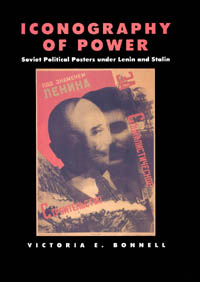 | Title: Iconography of power: Soviet political posters under Lenin and Stalin Author: Bonnell, Victoria E Published: University of California Press, 1998 Subjects: Sociology | Popular Culture | European Studies | Russian and Eastern European Studies | Politics | Art Criticism | History | European History Publisher's Description: Masters at visual propaganda, the Bolsheviks produced thousands of vivid and compelling posters after they seized power in October 1917. Intended for a semi-literate population that was accustomed to the rich visual legacy of the Russian autocracy and the Orthodox Church, political posters came to occupy a central place in the regime's effort to imprint itself on the hearts and minds of the people and to remold them into the new Soviet women and men. In this first sociological study of Soviet political posters, Victoria Bonnell analyzes the shifts that took place in the images, messages, styles, and functions of political art from 1917 to 1953. Everyone who lived in Russia after the October revolution had some familiarity with stock images of the male worker, the great communist leaders, the collective farm woman, the capitalist, and others. These were the new icons' standardized images that depicted Bolshevik heroes and their adversaries in accordance with a fixed pattern. Like other "invented traditions" of the modern age, iconographic images in propaganda art were relentlessly repeated, bringing together Bolshevik ideology and traditional mythologies of pre-Revolutionary Russia. Symbols and emblems featured in Soviet posters of the Civil War and the 1920s gave visual meaning to the Bolshevik worldview dominated by the concept of class. Beginning in the 1930s, visual propaganda became more prescriptive, providing models for the appearance, demeanor, and conduct of the new social types, both positive and negative. Political art also conveyed important messages about the sacred center of the regime which evolved during the 1930s from the celebration of the heroic proletariat to the deification of Stalin. Treating propaganda images as part of a particular visual language, Bonnell shows how people "read" them - relying on their habits of seeing and interpreting folk, religious, commercial, and political art (both before and after 1917) as well as the fine art traditions of Russia and the West. Drawing on monumental sculpture and holiday displays as well as posters, the study traces the way Soviet propaganda art shaped the mentality of the Russian people (the legacy is present even today) and was itself shaped by popular attitudes and assumptions. Iconography of Power includes posters dating from the final decades of the old regime to the death of Stalin, located by the author in Russian, American, and English libraries and archives. One hundred exceptionally striking posters are reproduced in the book, many of them never before published. Bonnell places these posters in a historical context and provides a provocative account of the evolution of the visual discourse on power in Soviet Russia. [brief] Similar Items |
| 282. | 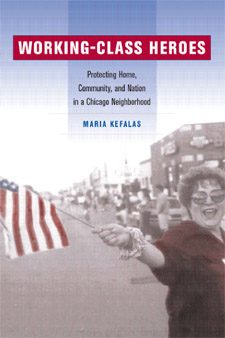 | Title: Working-class heroes: protecting home, community, and nation in a Chicago neighborhood Author: Kefalas, Maria Published: University of California Press, 2003 Subjects: Sociology | American Studies | Anthropology | Urban Studies | Ethnic Studies | Gender Studies | Politics | Social Problems | Urban Studies | Urban Studies Publisher's Description: Chicago's Southwest Side is one of the last remaining footholds for the city's white working class, a little-studied and little-understood segment of the American population. This book paints a nuanced and complex portrait of the firefighters, police officers, stay-at-home mothers, and office workers living in the stable working-class community known as Beltway. Building on the classic Chicago School of urban studies and incorporating new perspectives from cultural geography and sociology, Maria Kefalas considers the significance of home, community, and nation for Beltway residents. [brief] Similar Items |
| 283. |  | Title: Letters from freedom: post-cold war realities and perspectives Author: Michnik, Adam Published: University of California Press, 1998 Subjects: History | Politics | Russian and Eastern European Studies | Social and Political Thought | European History | Intellectual History Publisher's Description: A hero to many, Polish writer Adam Michnik ranks among today's most fearless and persuasive public figures. His imprisonment by Poland's military regime in the 1980s did nothing to quench his outpouring of writings, many of which were published in English as Letters from Prison . Beginning where that volume ended, Letters from Freedom finds Michnik briefly in prison at the height of the "cold civil war" between authorities and citizens in Poland, then released. Through his continuing essays, articles, and interviews, the reader can follow all the momentous changes of the last decade in Poland and East-Central Europe. Some of the writings have appeared in English in various publications; most are translated here for the first time.Michnik is never detached. His belief that people can get what they want without hatred and violence has always translated into action, and his actions, particularly the activity of writing, have required his contemporaries to think seriously about what it is they want. His commitment to freedom is absolute, but neither wild-eyed nor humorless; with a characteristic combination of idealism and pragmatism, Michnik says, "In the end, politics is the art of foreseeing and implementing the possible."Michnik's blend of conviction and political acumen is perhaps most vividly revealed in the interviews transcribed in the book, whether he is the subject of the interview or is conducting a conversation with Czeslaw Milosz, Vacláv Havel, or Wojciech Jaruzelski. These face-to-face exchanges tell more about the forces at work in contemporary Eastern Europe than could any textbook. Sharing Michnik's intellectual journey through a tumultuous era, we touch on all the subjects important to him in this wide-ranging collection and find they have importance for everyone who values conscience and responsibility. In the words of Jonathan Schell, "Michnik is one of those who bring honor to the last two decades of the twentieth century." [brief] Similar Items |
| 284. | 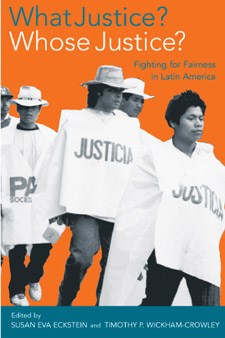 | Title: What justice? whose justice?: fighting for fairness in Latin America Author: Eckstein, Susan 1942- Published: University of California Press, 2003 Subjects: Sociology | Economics and Business | Conservation | Latin American Studies | Politics | Postcolonial Studies | Anthropology | Social Problems Publisher's Description: The new millennium began with the triumph of democracy and markets. But for whom is life just, how so, and why? And what is being done to correct persisting injustices? Blending macro-level global and national analysis with in-depth grassroots detail, the contributors highlight roots of injustices, how they are perceived, and efforts to alleviate them. Following up on issues raised in the groundbreaking best-seller Power and Popular Protest: Latin American Social Movements (California, 2001), these essays elucidate how conceptions of justice are socially constructed and contested and historically contingent, shaped by people's values and institutionally grounded in real-life experiences. The contributors, a stellar coterie of North and Latin American scholars, offer refreshing new insights that deepen our understanding of social justice as ideology and practice. [brief] Similar Items |
| 285. | 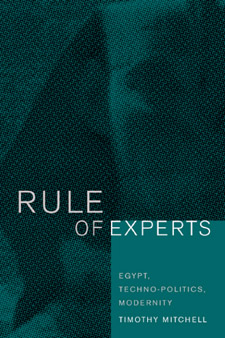 | Title: Rule of experts: Egypt, techno-politics, modernity Author: Mitchell, Timothy 1955- Published: University of California Press, 2002 Subjects: Politics | Middle Eastern Studies | Cultural Anthropology | Postcolonial Studies | Economics and Business | Middle Eastern History | Sociology Publisher's Description: Can one explain the power of global capitalism without attributing to capital a logic and coherence it does not have? Can one account for the powers of techno-science in terms that do not merely reproduce its own understanding of the world? Rule of Experts examines these questions through a series of interrelated essays focused on Egypt in the twentieth century. These explore the way malaria, sugar cane, war, and nationalism interacted to produce the techno-politics of the modern Egyptian state; the forms of debt, discipline, and violence that founded the institution of private property; the methods of measurement, circulation, and exchange that produced the novel idea of a national "economy," yet made its accurate representation impossible; the stereotypes and plagiarisms that created the scholarly image of the Egyptian peasant; and the interaction of social logics, horticultural imperatives, powers of desire, and political forces that turned programs of economic reform in unanticipated directions. Mitchell is a widely known political theorist and one of the most innovative writers on the Middle East. He provides a rich examination of the forms of reason, power, and expertise that characterize contemporary politics. Together, these intellectually provocative essays will challenge a broad spectrum of readers to think harder, more critically, and more politically about history, power, and theory. [brief] Similar Items |
| 286. | 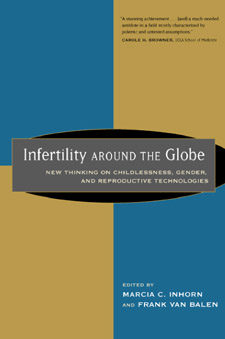 | Title: Infertility around the globe: new thinking on childlessness, gender, and reproductive technologies Author: Inhorn, Marcia Claire 1957- Published: University of California Press, 2002 Subjects: Anthropology | Cultural Anthropology | Asian Studies | Medical Anthropology | Ethnic Studies | Gender Studies | Politics | Medicine | Sociology | Sociology Publisher's Description: This exceptional collection of essays breaks new ground by examining the global impact of infertility as a major reproductive health issue, one that has profoundly affected the lives of countless women and men. Based on original research by seventeen internationally acclaimed social scientists, it is the first book to investigate the use of reproductive technologies in non-Western countries. Provocative and incisive, it is the most substantial work to date on the subject of infertility. With infertility as the lens through which a wide range of social issues is explored, the contributors address a far-reaching array of topics: why infertility has been neglected in population studies, how the deeply gendered nature of infertility sets the blame squarely on women's shoulders, how infertility and its treatment transform family dynamics and relationships, and the distribution of medical and marital power. The chapters present informed and sophisticated investigations into cultural perceptions of infertility in numerous countries, including China, India, the nations of sub-Saharan Africa, Vietnam, Costa Rica, Egypt, Israel, the United States, and the nations of Europe. Poised to become the quintessential reference on infertility from an international social science perspective, Infertility around the Globe makes a powerful argument that involuntary childlessness is a complex phenomenon that has far-reaching significance worldwide. [brief] Similar Items |
| 287. | 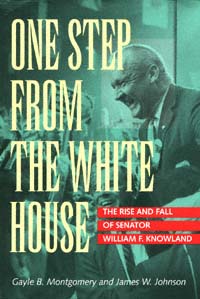 | Title: One step from the White House: the rise and fall of Senator William F. Knowland Author: Montgomery, Gayle B 1934- Published: University of California Press, 1998 Subjects: Politics | Autobiographies and Biographies | California and the West | Californian and Western History | American Studies | United States History Publisher's Description: During the Cold War years of the 1950s, William F. Knowland was one of the most important figures in American politics. As the Republican leader of the U.S. Senate, the wealthy California newspaper heir was recognized and respected by millions. His influence with President Eisenhower led to Earl Warren's appointment as chief justice, and Knowland set in motion a U.S.-China policy that remains part of our international direction today. Yet he committed suicide in 1974, following a personal decline that included political humiliation, a ruined marriage, and the loss of his family fortune.This is the first full-scale biography of Bill Knowland, written by two journalists who came to know him after he left Washington in 1958. Gayle B. Montgomery was a political editor at the Oakland Tribune , the newspaper owned by Knowland's father, the power-wielding Joseph R. Knowland. James W. Johnson was a Tribune editorial writer. Both men worked with Knowland when he returned to the newspaper after giving up his Senate seat in a failed bid to become governor of California. Knowland lost the governorship race to Edmund G. (Pat) Brown; had he won, many observers felt Knowland would have had a clear shot at the White House.This is a book not only about Mr. Republican, but also one that illuminates the strengths and deficiencies of Republican party politics during the years when the party was at its zenith. In portraying the life of Bill Knowland, the authors cast a glaring light both on the machinations of political power and on the Republican establishment's aspirations in the Warren-Eisenhower era. [brief] Similar Items |
| 288. |  | Title: Western times and water wars: state, culture, and rebellion in California Author: Walton, John 1937- Published: University of California Press, 1991 Subjects: History | Politics | California and the West | United States History | Californian and Western History | Social Theory | Environmental Studies Publisher's Description: Western Times and Water Wars chronicles more than a hundred years of tumultuous events in the history of California's Owens Valley. From the pioneer conquest of the native inhabitants to the infamous destruction of the valley's agrarian economy by water-hungry Los Angeles, this legendary setting is . . . [more] Similar Items |
| 289. | 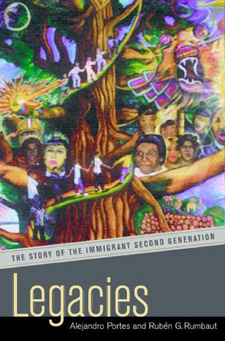 | Title: Legacies: the story of the immigrant second generation Author: Portes, Alejandro 1944- Published: University of California Press, 2001 Subjects: Sociology | Ethnic Studies | Anthropology | Asian American Studies | Chicano Studies | Postcolonial Studies | Politics | Latino Studies | Social Problems | Immigration Publisher's Description: One out of five Americans, more than 55 million people, are first-or second-generation immigrants. This landmark study, the most comprehensive to date, probes all aspects of the new immigrant second generation's lives, exploring their immense potential to transform American society for better or worse. Whether this new generation reinvigorates the nation or deepens its social problems depends on the social and economic trajectories of this still young population. In Legacies, Alejandro Portes and Rubén G. Rumbaut - two of the leading figures in the field - provide a close look at this rising second generation, including their patterns of acculturation, family and school life, language, identity, experiences of discrimination, self-esteem, ambition, and achievement. Based on the largest research study of its kind, Legacies combines vivid vignettes with a wealth of survey and school data. Accessible, engaging, and indispensable for any consideration of the changing face of American society, this book presents a wide range of real-life stories of immigrant families - from Mexico, Cuba, Nicaragua, Colombia, the Dominican Republic, Haiti, Jamaica, Trinidad, the Philippines, China, Laos, Cambodia, and Vietnam - now living in Miami and San Diego, two of the areas most heavily affected by the new immigration. The authors explore the world of second-generation youth, looking at patterns of parent-child conflict and cohesion within immigrant families, the role of peer groups and school subcultures, the factors that affect the children's academic achievement, and much more. A companion volume to Legacies, entitled Ethnicities: Children of Immigrants in America, was published by California in Fall 2001. Edited by the authors of Legacies, this book will bring together some of the country's leading scholars of immigration and ethnicity to provide a close look at this rising second generation. A Copublication with the Russell Sage Foundation [brief] Similar Items |
| 290. | 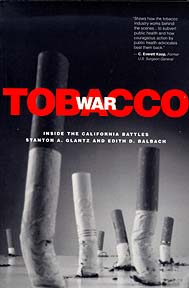 | Title: Tobacco war: inside the California battles Author: Glantz, Stanton A Published: University of California Press, 2000 Subjects: American Studies | California and the West | Public Policy | Politics | Social Problems | Economics and Business | Medicine | Environmental Studies | Sociology Publisher's Description: Tobacco War charts the dramatic and complex history of tobacco politics in California over the past quarter century. Beginning with the activities of a small band of activists who, in the 1970s, put forward the radical notion that people should not have to breathe second-hand tobacco smoke, Stanton Glantz and Edith Balbach follow the movement through the 1980s, when activists created hundreds of city and county ordinances by working through their local officials, to the present--when tobacco is a highly visible issue in American politics and smoke-free restaurants and bars are a reality throughout the state. The authors show how these accomplishments rest on the groundwork laid over the past two decades by tobacco control activists who have worked across the U.S. to change how people view the tobacco industry and its behavior. Tobacco War is accessibly written, balanced, and meticulously researched. The California experience provides a graphic demonstration of the successes and failures of both the tobacco industry and public health forces. It shows how public health advocates slowly learned to control the terms of the debate and how they discovered that simply establishing tobacco control programs was not enough, that constant vigilance was necessary to protect programs from a hostile legislature and governor. In the end, the California experience proves that it is possible to dramatically change how people think about tobacco and the tobacco industry and to rapidly reduce tobacco consumption. But California's experience also demonstrates that it is possible to run such programs successfully only as long as the public health community exerts power effectively. With legal settlements bringing big dollars to tobacco control programs in every state, this book is must reading for anyone interested in battling and beating the tobacco industry. [brief] Similar Items |
| 291. | 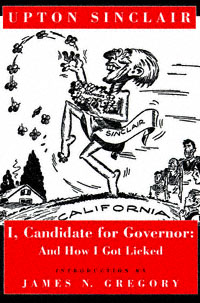 | Title: I, candidate for governor: and how I got licked Author: Sinclair, Upton 1878-1968 Published: University of California Press, 1994 Subjects: History | Politics | California and the West | United States History | Californian and Western History | Autobiography | American Studies Publisher's Description: Here, reprinted for the first time since its original publication, is muckraking journalist Upton Sinclair's lively, caustic account of the 1934 election campaign that turned California upside down and almost won him the governor's mansion.Using his "End Poverty in California" movement (more commonly called EPIC) as a springboard, Sinclair ran for governor as a Democrat, equipped with a bold plan to end the Depression in California by taking over idle land and factories and turning them into cooperative ventures for the unemployed. To his surprise, thousands rallied to the idea, converting what he had assumed would be another of his utopian schemes into a mass political movement of extraordinary dimensions. With a loosely knit organization of hundreds of local EPIC clubs, Sinclair overwhelmed the moderate Democratic opposition to capture the primary election. When it came to the general election, however, his opposition employed highly effective campaign tactics: overwhelming media hostility, vicious red-baiting and voter intimidation, high-priced dirty tricks. The result was a resounding defeat in November. I, Candidate tells the story of Sinclair's campaign while also capturing the turbulent political mood of the 1930s. Employing his trademark muckraking style, Sinclair exposes the conspiracies of power that ensured big-money control over the media and other powerful institutions. [brief] Similar Items |
| 292. | 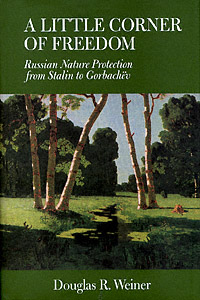 | Title: A little corner of freedom: Russian nature protection from Stalin to Gorbachëv Author: Weiner, Douglas R 1951- Published: University of California Press, 1999 Subjects: Russian and Eastern European Studies | Environmental Studies | Politics | History | History and Philosophy of Science | Ecology Publisher's Description: While researching Russia's historical efforts to protect nature, Douglas Weiner unearthed unexpected findings: a trail of documents that raised fundamental questions about the Soviet political system. These surprising documents attested to the unlikely survival of a critical-minded, scientist-led movement through the Stalin years and beyond. It appeared that, within scientific societies, alternative visions of land use, resrouce exploitation, habitat protection, and development were sustained and even publicly advocated. In sharp contrast to known Soviet practices, these scientific societies prided themselves on their traditions of free elections, foreign contacts, and a pre-revolutionary heritage.Weiner portrays nature protection activists not as do-or-die resisters to the system, nor as inoffensive do-gooders. Rather, they took advantage of an unpoliced realm of speech and activity and of the patronage by middle-level Soviet officials to struggle for a softer path to development. In the process, they defended independent social and professional identities in the face of a system that sought to impose official models of behavior, ethics, and identity for all. Written in a lively style, this absorbing story tells for the first time how organized participation in nature protection provided an arena for affirming and perpetuating self-generated social identities in the USSR and preserving a counterculture whose legacy survives today. [brief] Similar Items |
| 293. | 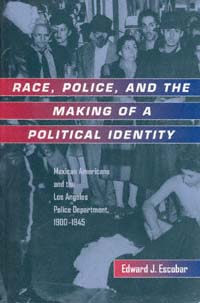 | Title: Race, police, and the making of a political identity: Mexican Americans and the Los Angeles Police Department, 1900-1945 Author: Escobar, Edward J 1946- Published: University of California Press, 1999 Subjects: History | California and the West | Latin American History | Latino Studies | Social Problems | Politics | Californian and Western History | Urban Studies | Criminology | Criminology Publisher's Description: In June 1943, the city of Los Angeles was wrenched apart by the worst rioting it had seen to that point in the twentieth century. Incited by sensational newspaper stories and the growing public hysteria over allegations of widespread Mexican American juvenile crime, scores of American servicemen, joined by civilians and even police officers, roamed the streets of the city in search of young Mexican American men and boys wearing a distinctive style of dress called a Zoot Suit. Once found, the Zoot Suiters were stripped of their clothes, beaten, and left in the street. Over 600 Mexican American youths were arrested. The riots threw a harsh light upon the deteriorating relationship between the Los Angeles Mexican American community and the Los Angeles Police Department in the 1940s.In this study, Edward J. Escobar examines the history of the relationship between the Los Angeles Police Department and the Mexican American community from the turn of the century to the era of the Zoot Suit Riots. Escobar shows the changes in the way police viewed Mexican Americans, increasingly characterizing them as a criminal element, and the corresponding assumption on the part of Mexican Americans that the police were a threat to their community. The broader implications of this relationship are, as Escobar demonstrates, the significance of the role of the police in suppressing labor unrest, the growing connection between ideas about race and criminality, changing public perceptions about Mexican Americans, and the rise of Mexican American political activism. [brief] Similar Items |